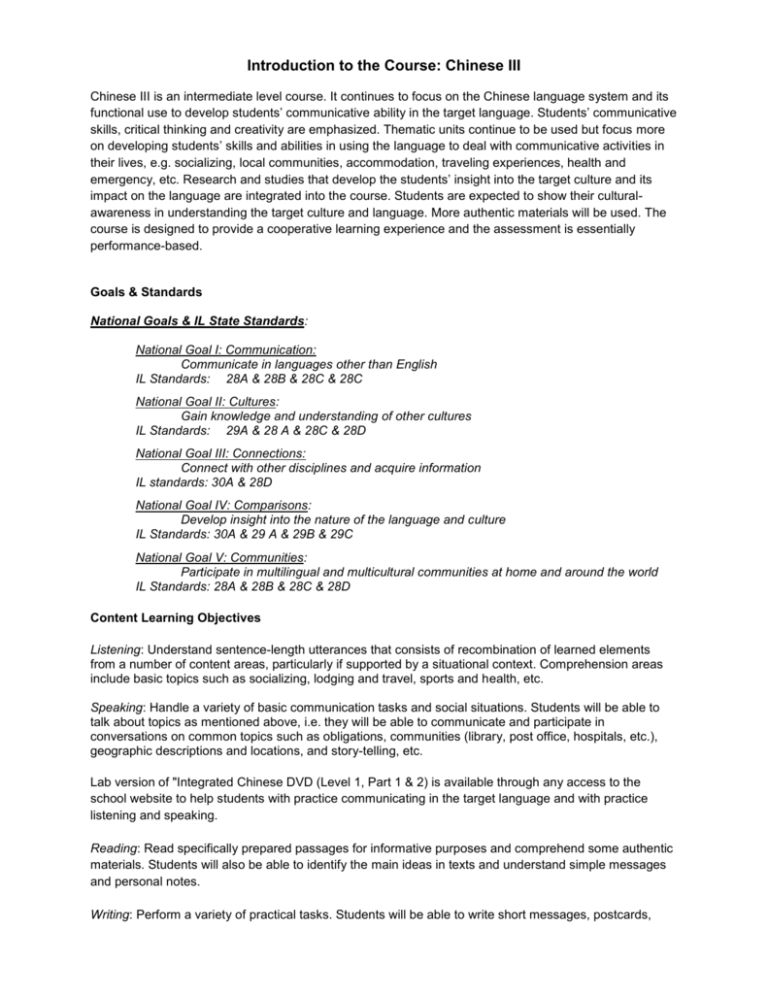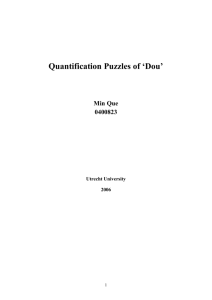
Introduction to the Course: Chinese III
Chinese III is an intermediate level course. It continues to focus on the Chinese language system and its
functional use to develop students’ communicative ability in the target language. Students’ communicative
skills, critical thinking and creativity are emphasized. Thematic units continue to be used but focus more
on developing students’ skills and abilities in using the language to deal with communicative activities in
their lives, e.g. socializing, local communities, accommodation, traveling experiences, health and
emergency, etc. Research and studies that develop the students’ insight into the target culture and its
impact on the language are integrated into the course. Students are expected to show their culturalawareness in understanding the target culture and language. More authentic materials will be used. The
course is designed to provide a cooperative learning experience and the assessment is essentially
performance-based.
Goals & Standards
National Goals & IL State Standards:
National Goal I: Communication:
Communicate in languages other than English
IL Standards: 28A & 28B & 28C & 28C
National Goal II: Cultures:
Gain knowledge and understanding of other cultures
IL Standards: 29A & 28 A & 28C & 28D
National Goal III: Connections:
Connect with other disciplines and acquire information
IL standards: 30A & 28D
National Goal IV: Comparisons:
Develop insight into the nature of the language and culture
IL Standards: 30A & 29 A & 29B & 29C
National Goal V: Communities:
Participate in multilingual and multicultural communities at home and around the world
IL Standards: 28A & 28B & 28C & 28D
Content Learning Objectives
Listening: Understand sentence-length utterances that consists of recombination of learned elements
from a number of content areas, particularly if supported by a situational context. Comprehension areas
include basic topics such as socializing, lodging and travel, sports and health, etc.
Speaking: Handle a variety of basic communication tasks and social situations. Students will be able to
talk about topics as mentioned above, i.e. they will be able to communicate and participate in
conversations on common topics such as obligations, communities (library, post office, hospitals, etc.),
geographic descriptions and locations, and story-telling, etc.
Lab version of "Integrated Chinese DVD (Level 1, Part 1 & 2) is available through any access to the
school website to help students with practice communicating in the target language and with practice
listening and speaking.
Reading: Read specifically prepared passages for informative purposes and comprehend some authentic
materials. Students will also be able to identify the main ideas in texts and understand simple messages
and personal notes.
Writing: Perform a variety of practical tasks. Students will be able to write short messages, postcards,
simple letters and notes. They will also be able to produce statements about personal preferences, daily
routines, everyday events, etc. using learned vocabulary and structures on familiar topics.
Textbooks & Materials:
1.“Integrated Chinese Level I – Part 2” (Third Edition),Textbook, Workbook and Character Book. Boston:
Cheng & Tsui Company. 2011
2. Audio Recordings for “Integrated Chinese Level I – Part 2”. Available on CD or as a downloadable
MP3s from www.cheng-tusi.com
3. “Integrated Chinese Companion Site: http://www.Integrated-Chinese.com
4. “Integrated Chinese DVD (Level 1, Part 1 & 2). Boston: Cheng & Tsui Company. 2011. Available from
the Language Lab at Jones College Prep or from www.cheng-tusi.com
5. “Chinese Link”. Pearson Prentice Hall. 2006.
6. “Experiencing Chinese”. Beijing: Higher Education Press. 2009
Required Materials for Class:
- textbook
- a binder for keeping assignments, handouts, quizzes and readings separately in several folders
- a notebook for taking notes in class, keeping instructions for homework, assignments and projects, etc.
Course Evaluation:
Grades will be cumulative per semester and will be based on the following:
Course Work (homework, oral or written class work, bellringers ) = 15%
Class Participation (various oral communicative activities, interactive or individual/group) = 20%
Assessments (tests and quizzes) = 20%
Projects and Presentations = 15%
Lab Assignments (listening activities, research) = 10%
Final Exam (per semester) = 20%
JCP Grading Scale:
90% -100% = A
80% - 89% = B
70% - 79% = C
60% - 69% = D
Below 60% = F
Grades Expectations:
A: Indicates learning at the highest level. The student not only has demonstrated knowledge and
understanding of the material but also with breadth and depth of understanding. An A indicates work that
has gone above and beyond the expectations of an assignment.
B: The student not only has demonstrated knowledge and understanding of the material but also applies
to the material. The student will be able, on occasion, to demonstrate an ability to analyze, synthesize,
and evaluate the material.
C: The student has demonstrated a basic knowledge and understanding of the material and some ability
to apply it.
D: The student has demonstrated a limited knowledge and limited understanding of the material and is
not able to apply much of it.
F: The student has not demonstrated knowledge and understanding of the material and therefore cannot
apply it.
Policies & Student Responsibilities:
Class Preparation & Participation: All students are expected to prepare for class and participate actively
in class.
Homework & Assignments: Please be prompt with all homework and assignments. Students are expected
to listen to the audio recordings and practice speaking and writing on a regular basis either in or outside a
class for preparation and review.
Late work: Unexcused late work will be accepted for 50% credit if it is turned in by the end of the same
school week. Late work for excused absences will be accepted for full credit if it is turned in by the end of
the school week unless other arrangements are made.
Extra credit opportunities will be available provided that all coursework etc. is complete; however, extra
credit should not be expected to alter a grade by a full letter.
Quizzes & Tests: Efforts should be made to take quizzes and tests at the specified times. They have
been designed at a particular point to help you with your progress and to identify areas that could use
extra work and help you focus your study time.
Retakes of tests or quizzes are not possible. Missing tests (including dictation and listening
comprehension in class) must be made up at students’ request within a reasonable time period; a zero
grade will be given to a missing test.
Academic dishonesty and other behavioral issues will be subject to consequences listed in the JCP
handbook.
Any use of translation device with the exception of a dictionary will be considered plagiarism. You will not
receive credit for the assignment, and the disciplinarian and your parents will be contacted. You will learn
more and score higher in my class if your assignments are in your own words.
Classroom Expectations:
EXPECT to be respectful to yourself, your classmates, your teacher, and your classroom environment.
EXPECT to be responsible to come to class prepared and to work EVERYDAY ALL DAY.
EXPECT to be punctual to come to class everyday on time.
EXPECT to challenge yourself and be challenged.
Language Lab Regulations:
Since language lab work is an indispensable part of language teaching, it is very important that the
following rules are observed by each student.
1. Remain in your designated seat all the time unless permission is given by the teacher on account of
computer failure.
2. No food or drinks are allowed in the lab.
3. Remain on task in lab classes and no free surfing on the internet is allowed while in the lab.
4. Take good care of the facilities in the lab. No tampering and no changing of the existing configurations
are allowed.
5. The signing student and parents are responsible for any damages done to the facilities in the lab
assigned the student and therefore if the student detects any existing damage caused by other students,
please report to the teacher.
Subject to Change
Chinese Program
Unit Plan (Chinese III)
Week Unit
Lesson & Title
Content & Vocab
Grammer
Supplementary
1--5
Review and
Vocab and
expressions
Directional complements (II),
Review the vocab
and
Lesson 16:
used in describing
sick-
Questions with "shibushi"
expressions in
Lesson
Seeing
ness, visiting doctors
and
or "duibudui",
12-15.
a Doctor
treatments.
Measure word "ci" for
actions.
Lesson 17:
Vocab and
expressions
Descriptive complements (II),
The usage of "jiu".
Dating
of making
appointments
Potential complements and
Writing and art
project.
and inviting
people;ways
reduplication of verbs.
6--10
1
2
of refusing an
invitation.
11-15
16-20
3
4
Lesson18:
Vocab and
expressions
The usage of "le"particle,
The structure of
Renting an
of renting ads, of dis-
Potential complements with
"lian..dou/yie",
Apartment
cussing the
location,con-
verb plus "buxia",
The usage of "duo" in
ditions and rent of an
Interrogative pronouns with
approximate
numbers.
apartment.
"dou""yie".
Lesson 19:
Vocab and
expressions
Directional complements
A different way
At the Post
used in discussing
indicating results,
of expressing
Office
different types of
letters, packages,
The usage of conjunction
"jiu",
approximation,"yue…
postage and postal
services.
"chuli..yiwai...hai/dou"
yue…" structure,
structure.
Listening comprehension.
21-25
5
Lesson 20:
Vocab and
expressions
Passive -voice sentences,
Verb plus time
duration
Sports
used in talking about
The usage of "hao/nan" ,
plus objects structre.
different types of
sports and the pros
and cons.
26-30
31-34
6
7
Lesson 21:
Vocab and
expressions
Large numbers in Chinese,
"youde" & "yixie",
Travel
used in talking about
Interrogative pronouns as
Writing and art
project.
vacation and travel
plans,
indefinite references and
tickets and flights.
more on the usage of "bi".
Lesson 22:
Vocab and
expressions
Kinship terms,
The dynamic particle
Hometown
used in discussing and
Existential sentences.
"zhe",The usage of
describing the scenary,
"yiwei",
Adjective/verb
location, climate,popu-
plus "shi" plus
lation…of one's
adjective/verb plus
but.
hometown.
35-39
8
Lesson 23:
Vocav and expressions
The usage of three "de" in
"Hai" plus positive
At the Airport
used in seeing people
Chinese sentences,
adjectives,"Cai"
off and meeting
people
"Deshihou" and "yihou"
meaning "too early"
at the airport and in
compared,
or "not enough".
talking about a journey.
Potential complements with
verb plus "budong".
Subject to Change
Chinese Program








